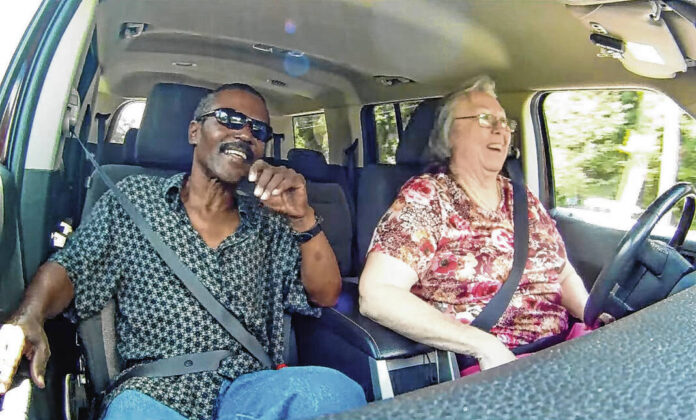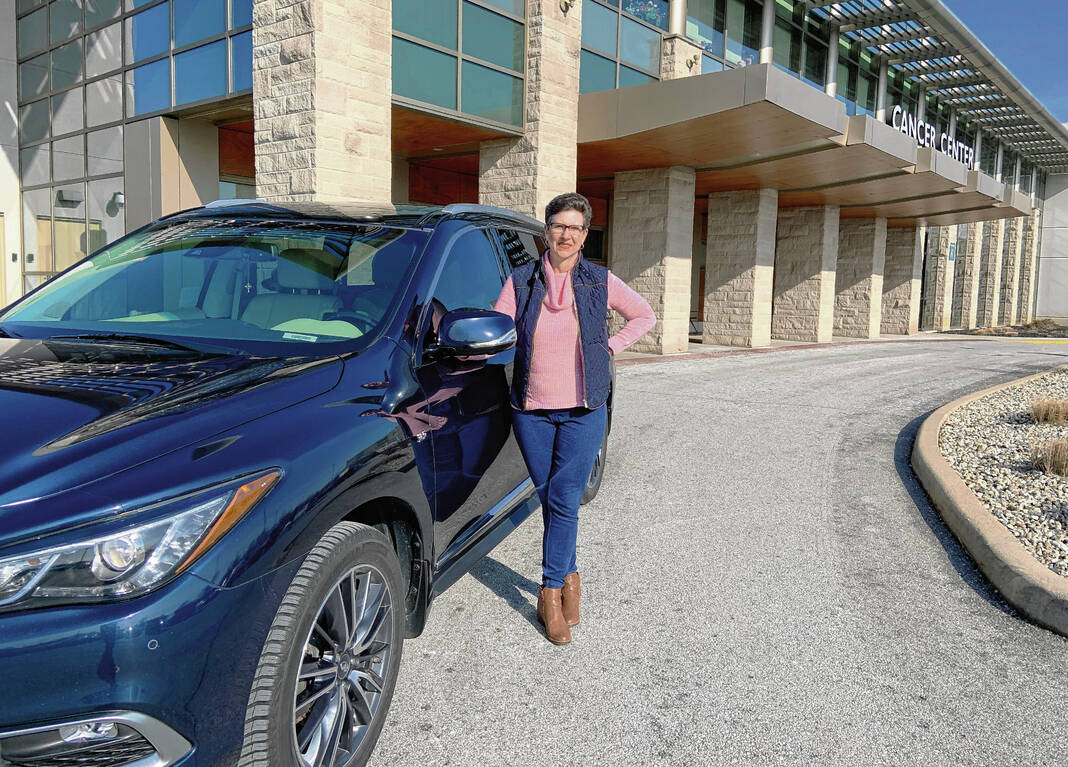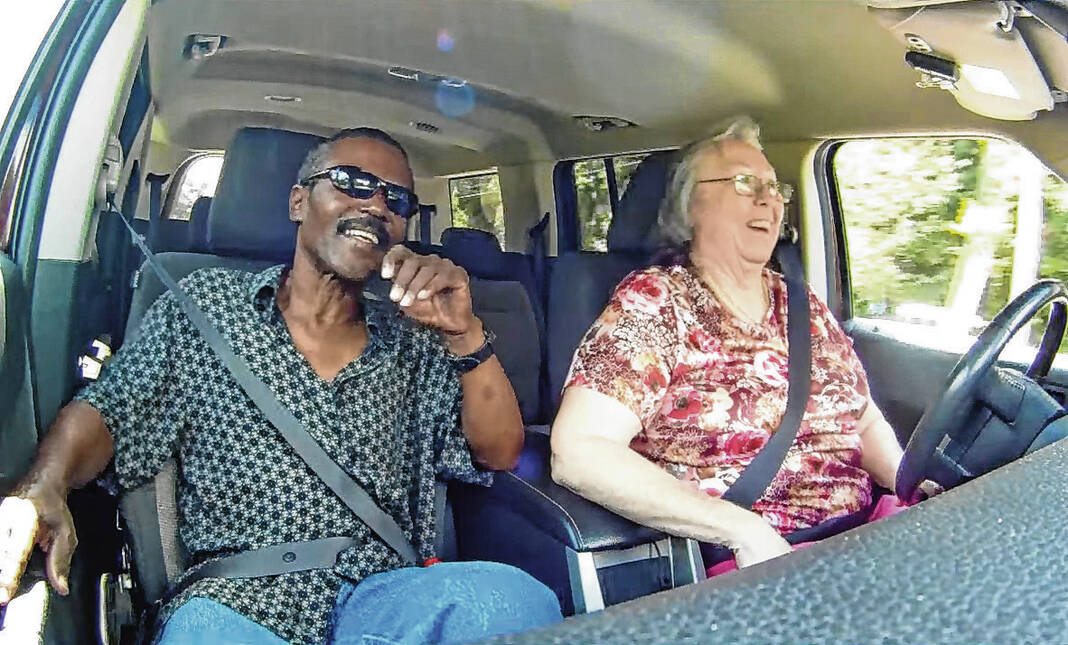
A volunteer driver with the American Cancer Society’s Road to Recovery program drives a patient from the hospital. Road to Recovery is again serving patients in central Indiana, including at Franciscan Health Cancer Center and Community MD Anderson Cancer Center-South, and is in need of volunteers to help drive people.
SUBMITTED PHOTO BY THE AMERICAN CANCER SOCIETY
A simple car ride, once a week, was enough to forge a meaningful connection.
Kris Hoopingarner was an active volunteer at her church, but was searching for additional opportunities in the community. The Greenwood resident came across a call out for the Road to Recovery program, a service of the American Cancer Society providing rides for cancer patients to and from treatment. She had a reliable car and the time to give; this was something she could do.
Yet she never anticipated how meaningful the service would be.
“It’s more of a blessing than it is a commitment. What you get out of it is more than you put into it,” she said. “There’s nothing like the feeling of helping someone who you know needs the help.”
More people like Hoopingarner are needed than ever before. After pausing for nearly three years, the Road to Recovery program is restarting at places such as Franciscan Health Cancer Center, offering free transportation for patients who need help getting to and from treatments and appointments.
Though it may seem like a simple task to perform, the volunteers who drive these patients are performing vital work, said Rachelle Anthony, senior manager of cancer support for the American Cancer Society in Indiana.
“A patient’s ability to get to treatment is all about life or death,” she said. “If a patient can’t get to treatment, they can’t stay on track with their treatment plan that’s been designed for them by their physicians. This could really impact their long-term survival chances.”
Road to Recovery is an American Cancer Society program ensuring that people can get the care they need to get healthy. Often, patients have no way to get to the hospital for appointments, or they are so ill that they can’t physically drive themselves.
On the national level, the Road to Recovery program started in 1981. Since that time, more than 9 million rides have been provided to more than 490,000 patients.
Transportation is one of the biggest roadblocks when receiving cancer treatment, Anthony said.
“We have communities without public transportation. Lyft or Uber is there, but it can be cost-prohibitive when you consider the impact that cancer treatment already has on patients and their families,” she said. “You have family members who still have to work, they need to maintain insurance, so they can’t provide transport.”
Fighting cancer is difficult and stressful as it is, without trying to figure out how to get to the hospital or your doctor, said Joan Himebrook, accreditation and community outreach coordinator for the Franciscan Health Cancer Center.
“So much of cancer care is long-term. Patients are going through so many phases of their cancer care, from diagnosis, maybe surgery, maybe infusion or chemotherapy and then radiation therapy. It can involve one or two years of treatment,” she said. “The outcome of your treatment depends on being there and getting the treatment you need and not skipping or missing those treatments.”
The American Cancer Society works with health care systems all over Indiana to coordinate rides, including Community Cancer Center South and Franciscan Health Cancer Center. Patients must be traveling to a cancer-related medical appointment and other eligibility requirements may apply. For example, a caregiver will need to accompany a patient who needs assistance walking, or is under age 18.
But Road to Recovery had to stop during the COVID-19 pandemic. Only in the spring of 2022 did the American Cancer Society re-launch the program in Indianapolis and surrounding counties, including Johnson.
For Franciscan Health Cancer Center, restarting the program for their patients was a priority.
”It’s important for us to remove as many barriers as we can to make sure they get to their treatment, and that it’s very consistent, and they have a safe and reliable way to make that happen,” Himebrook said.
Hoopingarner has been involved with Road to Recovery since 2015, and has continued to offer rides now that the program is restarted. When she began, she told organizers that Wednesday was her best day to drive.
So she would be given a constant stream of patients who had appointments that day. Picking up and dropping off the same people week after week, she found herself in the midst of meaningful conversations with people facing huge challenges.
“You really got to know them. There was a relationship,” she said. “They can talk to you, they can complain, they can tell you they don’t feel very good and they feel sad — stuff they might not do with their family.”
Sometimes, Hoopingarner learned after providing rides that a patient had lost their battle with cancer, which can be hard. But she’s still relishes the chance to help people through the program.
“They are so very appreciative because when you have 30 appointments for radiation, trying to get your family to be able to loosen up their schedules from work to drive them, that is just really difficult,” she said.
As the program picks back up, organizers need the community’s help to ensure the program moves forward seamlessly. Both the American Cancer Society and Franciscan Health Cancer Center are looking for qualified volunteer drivers to take part.
Currently, the program has about 25 volunteers, but could easily double or triple that number to meet the needs of local patients, Anthony said.
Drivers must be between the ages of 18 and 84, have a valid driver’s license, pass a background check, show proof of COVID-19 vaccination, and have access to a safe, reliable car.
“We have individuals in the community who are willing to share their time, their vehicle and, really, their compassion and commitment to get that patient in to treatment,” Anthony said. “The program is only as great as the volunteers we have.”
AT A GLANCE
Road to Recovery
What: A program of the American Cancer Society providing transportation to and from treatment for people with cancer who do not have a ride or are unable to drive themselves.
Who can get a ride: Patients must be traveling to a cancer-related medical appointment and other eligibility requirements may apply. For example, a caregiver will need to accompany a patient who needs assistance walking, or is under age 18.
What do they need: Volunteer drivers are needed to help as the program gets started again.
How to volunteer: Go to cancer.org/drive or call 800-227-2345. Volunteer drivers must be between the ages of 18 and 84, have a valid driver’s license, pass a background check, show proof of COVID-19 vaccination and have access to a safe, reliable car.









